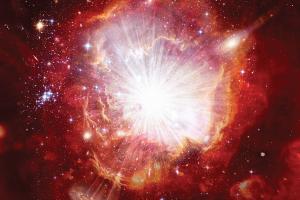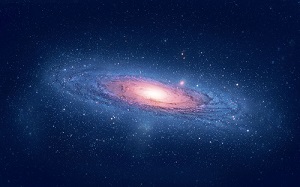
For a change of pace, this is about the universe and everything.
Supposedly dark matter makes up 80% of the universe, yet no-one has ever seen even a little bit of it.
The time has come to give up on the idea altogether, according to Mordehai Milgrom in an interview with Marcus Chown for the New Scientist (paywalled, but Google him and you’ll find plenty).
Dark matter was inferred to explain the movement of stars in a galaxy. Stars at ever greater distance from the centre should move more slowly because there is less gravity, according to Newtonian physics. But that doesn’t happen. The reason hypothesised is that each galaxy is embedded in a ‘halo’ of dark matter which enhances gravity at the outer regions.
Problem is, there is no consistency. Each galaxy needs its own arbitrary quantum of dark matter distributed in a unique way to explain what actually happens.
Moreover there is no predictive power in the theory.
Among other things, it predicts that we should see many more dwarf galaxies orbiting our Milky Way than we actually do.
I wonder if he means stars.
Milgrom has been on the case for quite a while and in 1981 came up with his alternative modified Newtonian dynamics (MOND) concept. He says:
The meagre data we had then could be explained if at a critical acceleration – a mere hundred billionth of a g – gravity switched from a type that weakens in line with the familiar Newtonian law to a type that falls off more slowly, following a different law. That alternative law is MOND.
He published three papers on his theory which were met with silence.
He says dark matter is the hypothesis of least daring. Just tip in some gravitating stuff that gives out no light. MOND appalled people because it tampered with the basic laws of physics. To be taken seriously it needed to be made compatible with Einstein’s principles of relativity.
This had to wait for one Jacob Benkenstein in 2004. He came up with a theory known as TeVeS (tensor-vector-scalar).
TeVeS describes gravity with three fields and made MOND compatible with Einstein’s relativity. After it was introduced, people started to take MOND more seriously.
Is MOND more elegant than dark matter?
It is certainly far more economical. For every galaxy, dark matter theorists must fit a made-to-measure amount and distribution of dark matter. So, if we understand 10 galaxies, we still don’t understand an 11th. Dark matter explains only after the fact. MOND predicts things ahead of time. This is key.
Also:
A single MOND formula perfectly describes every spiral galaxy, even though the birth of each one is chaotic, complex and unique. It is hard to see how the dark matter model can explain this.
Literally hundreds of MOND predictions have been vindicated and some 700 papers on the theory have been published in the last few years.
So if you hear about dark matter, unless the story is that the stuff has finally been found, take it with a grain of salt. It’s an old idea that doesn’t work very well. If you hear about MOND, then listen carefully, we could be getting closer to a theory of the universe and everything.
Just for fun here’s Andromeda Galaxy:






